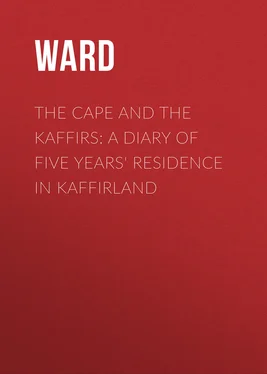Ward - The Cape and the Kaffirs - A Diary of Five Years' Residence in Kaffirland
Здесь есть возможность читать онлайн «Ward - The Cape and the Kaffirs - A Diary of Five Years' Residence in Kaffirland» — ознакомительный отрывок электронной книги совершенно бесплатно, а после прочтения отрывка купить полную версию. В некоторых случаях можно слушать аудио, скачать через торрент в формате fb2 и присутствует краткое содержание. Издательство: Иностранный паблик, Жанр: foreign_prose, История, foreign_edu, foreign_antique, на английском языке. Описание произведения, (предисловие) а так же отзывы посетителей доступны на портале библиотеки ЛибКат.
- Название:The Cape and the Kaffirs: A Diary of Five Years' Residence in Kaffirland
- Автор:
- Издательство:Иностранный паблик
- Жанр:
- Год:неизвестен
- ISBN:нет данных
- Рейтинг книги:4 / 5. Голосов: 1
-
Избранное:Добавить в избранное
- Отзывы:
-
Ваша оценка:
- 80
- 1
- 2
- 3
- 4
- 5
The Cape and the Kaffirs: A Diary of Five Years' Residence in Kaffirland: краткое содержание, описание и аннотация
Предлагаем к чтению аннотацию, описание, краткое содержание или предисловие (зависит от того, что написал сам автор книги «The Cape and the Kaffirs: A Diary of Five Years' Residence in Kaffirland»). Если вы не нашли необходимую информацию о книге — напишите в комментариях, мы постараемся отыскать её.
The Cape and the Kaffirs: A Diary of Five Years' Residence in Kaffirland — читать онлайн ознакомительный отрывок
Ниже представлен текст книги, разбитый по страницам. Система сохранения места последней прочитанной страницы, позволяет с удобством читать онлайн бесплатно книгу «The Cape and the Kaffirs: A Diary of Five Years' Residence in Kaffirland», без необходимости каждый раз заново искать на чём Вы остановились. Поставьте закладку, и сможете в любой момент перейти на страницу, на которой закончили чтение.
Интервал:
Закладка:
The gun from the “Abercrombie” announced her being under weigh, and we were obliged to depart in haste, the heavy surf and constant swell of the sea at Madeira rendering the passage from the shore to the ship always tedious and more or less difficult.
Almost every one has heard of Clementina, the beautiful nun, at the Convent at Madeira. Her name has been so often before the public that there can be no possible harm in relating a singular incident of which she was the heroine, and which occurred while we were there. A large party (from the English frigate lying like ourselves at anchor) landed and paid a visit to the convent. Among the group assembled in front of the grafting, behind which the nuns appear to receive visitors, was a Mr H. As Clementina advanced she caught sight of this gentleman, and had no sooner done so than with a sudden scream she fainted. Every one was amazed, Mr H as much so as any. On recovering her senses, the fair nun inquired if the gentleman who had caused her emotion bore the name of H? On being answered in the affirmative, she almost relapsed into a state of insensibility; but on recovering herself, she begged further to know if he was the Mr H with whom she had formerly eloped from the convent? It was explained that the Mr H she now saw was the cousin of her lover, to whom he bore an extraordinary resemblance. On learning this, she requested him to be the bearer of a letter from her to his cousin, which she afterwards forwarded to him, and then the curtain dropping between the nuns and the visitors closed this singular and romantic interview.
Again we set sail, and the same monotonous routine continued with little variation. Occasionally, we fell in with a passing ship looking like a thing of life upon the solitary world of waters, which brought us the consolation of being able to write homewards. Homeward letters! Ah! what eager hearts at home were wishing for those letters! How much of affection, and sorrow, and anxiety, and prayerful love was in them I thought, as the bag, ere the boat departed for the “Homeward bound” lay at my feet upon the senseless deck! It is the habit of tracing the common things of life back to their sources, be they sad or sweet, which has sometimes given me pleasure, oftener pain. There moved off the gallant ship, there rang the cheers of our soldiers, there sounded the reckless voices of the young, the gay, the heartless, and the high-spirited, and while they perhaps were little thinking of the parents, the friends, the sisters, to whom they had sent home letters, my eyes were filling as:
“Eager memories rushed upon the heart
And burst oblivion’s cloud.”
On the 22nd of August there was a cry of “land!” and, on the following morning, the vast mountains forming the boundary of part of the south-western coast of Africa, lay stretched before us. Then Table Mountain and its smaller companions reared their cloud-capped crests; and the white villas at Green Point tantalised us with their proximity, from which, owing to the wind, we were obliged to bear away constantly. For two days we hovered in the offing, but on the evening of the 25th, we hailed the sound of our anchor-chains. It was a most lovely night, the unclouded moon illuminating the white houses in Cape Town, and the lofty mountains standing out in strong relief against the clear sky; while our bugles, drums, and fifes, made merry music on the poop of our gallant ship. How we lingered about, unwilling to retire to rest, so anxious were we for the morning! It came at last, and the commanding officer went ashore to report in due form our arrival to the Governor. On his return in a few hours, we learned that all of us, except the Colonel and the Major, were to proceed, by way of Algoa Bay, to the frontier. The flank companies and the band were to be brought from thence to Cape Town, and the three companies expected from Saint Helena were to be detained there on their arrival. Many of our party, especially the gentlemen, rejoiced at this; liking the prospect of an active and sporting life infinitely better than that which would be merely varied by lounging about Cape Town, attempting races, or philandering at the balls. We were to remain in harbour about five days for water and provisions, (our stock being quite exhausted) then to proceed on our voyage.
On Saturday morning, the 27th of August, all the officers not for duty obtained permission to go on shore; the command of the troops on board devolving on Captain Gordon, 91st regiment. All landed but six; my husband was one of those to remain, consequently I did not accept the kind invitation of a friend to accompany him with my little girl to his house near Cape Town. Afterwards, in the hour of danger, and in the time of extreme terror, I had a strange undefinable satisfaction in having remained, though the sight of my child made me wish I had sent her on shore in the morning. Towards evening, the wind increased considerably; but, though there was a heavy sea and every prospect of a gale, our captain depended on his anchors. The Agent, Lieutenant Black, R.N., had gone on shore on duty at four o’clock in the evening, and being invited to dine with the Governor at seven o’clock, was in consequence prevented, by the impossibility of boats getting off, from returning on board, The whole responsibility, therefore, devolved on the Master, Mr John Young. The wind and sea rising caused at first but little alarm; at twelve o’clock, however, the ship shivered; apparently from being struck by a heavy sea. She trembled in every joint, and the same sensation being almost immediately after felt again, it was evident the vessel touched the bottom and with some violence. I rose from my bed, and dressing my child and myself, we proceeded with my husband to the cuddy, where some of the officers were assembled round the stove, the night being bitterly cold. The captain, still depending on the strength of his anchor-chains, saw no great cause of alarm, and having put my child to sleep on a chair, which Captain Gordon kindly prepared for her, I retired again to my berth, and being quite worn out, soon fell fast asleep. I was awoke by my husband bidding me rise and come on deck immediately, the anchor-chains having both snapped one after the other. My little Isabel stood beside her father partly dressed, and pale and silent. I have no distinct recollection of what happened for the first half hour after this awful intelligence. I remember hearing the water splashing about my cabin, and seeing our little lamp swinging violently backwards and forwards. I remember being dragged in unshod feet along the wet deck, up the steerage hatchway, while my husband carried my child. I can remember, too, her little voice issuing from my bed, into which she had crept to fasten on her warm boots, and begging me not to be frightened.
“How calm she is!” said I, to my husband.
“Poor thing!” he whispered, “she does not know her danger.”
“Yes, I do,” she answered, overhearing us; “but mamma has often told me that God Almighty can take care of us if He pleases; and I keep saying that to myself, and then I am not half so frightened.”
I remember the very height of the storm, when the noise of the thunder could scarcely be distinguished from the roar of the waters, and the torrents of rain,—when the elements in fact howled wildly and angrily at one another,—when the lightning pouring, as one may call it, on our decks, blazed in at the fore windows of the cuddy, being horror-stricken at the ghastly faces assembled under the uncertain and flickering light of a broken lamp. I can remember when the water rose up to my knees, being carried between decks with my child, through rows of shrieking women and silent soldiers. The conduct of our men was beyond all praise.
For some time, I sat on a chest with my child, near the fore-hatch, the ship continuing to drive, every moment striking against the sand, and our only hopes resting on the coming of the dawn, which would show us where we were, the floods of rain preventing the lightning—vivid as it was—from doing this distinctly. About six in the morning, the master came down among us with some comfort, saying he hoped the ship was making a bed for herself in the sand. In truth, she had been all night like some great creature scratching her way through it with restless impatience. The rudder had been carried away from the first, the stern cabins knocked into one, and the sea bubbling up like a fountain in the after part of the ship. We were yet uncertain of our safety, for there were rocks not many hundred yards from us on which the “Waterloo” convict ship had already struck; but of her anon. Meanwhile, our people attaching a rope to a shot, fired it on shore, but in vain. All night the guns from the fort and other vessels had been giving awful warnings to the town, while the constant roll of musketry onboard the convict ship, led us to imagine that the convicts were mutinous. This was, however, discovered afterwards not to be the case; they had been loosened from their bonds on the first alarm, and desired to make use of the first possible means of escape.
Читать дальшеИнтервал:
Закладка:
Похожие книги на «The Cape and the Kaffirs: A Diary of Five Years' Residence in Kaffirland»
Представляем Вашему вниманию похожие книги на «The Cape and the Kaffirs: A Diary of Five Years' Residence in Kaffirland» списком для выбора. Мы отобрали схожую по названию и смыслу литературу в надежде предоставить читателям больше вариантов отыскать новые, интересные, ещё непрочитанные произведения.
Обсуждение, отзывы о книге «The Cape and the Kaffirs: A Diary of Five Years' Residence in Kaffirland» и просто собственные мнения читателей. Оставьте ваши комментарии, напишите, что Вы думаете о произведении, его смысле или главных героях. Укажите что конкретно понравилось, а что нет, и почему Вы так считаете.












